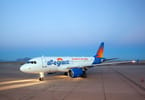CHICAGO – U.S. airline unions have intensified their calls for more oversight of industry alliances in a move that could spell trouble for existing and proposed tie-ups.
Amid a flurry of announcements late Friday, pilots at American Airlines hardened their opposition to plans to broaden its deal with British Airways PLC and Iberia on transatlantic flights by securing antitrust immunity from regulators for their Oneworld alliance.
Airline workers have voiced their concern or outright opposition to deepening alliances in the past, but the calls are becoming more strident just as regulators prepare to decide on the industry’s most contentious deal.
The Oneworld carriers are seeking parity with members of the rival Star and SkyTeam groupings, which already have already been granted limited immunity from competition laws to coordinate schedules, pricing and marketing. U.S. regulators are set to make their recommendation by the end of the month, while European authorities have already raised some concerns.
The Allied Pilots Association at American on Friday urged the U.S. Department of Transportation to decline the request for anti-trust immunity, stating its “unequivocal opposition”. American’s pilots cited the recent concerns from the European Commission about the Oneworld deal, reiterating claims it could cost U.S. jobs and harm consumer interests.
The chorus was joined by the Air Line Pilots’ Association, International, a larger industry grouping that includes flight crew at Delta Air Lines Inc. and the United Airlines unit of UAL Corp., two leading members of immunized alliances. Alpa stopped short of calling for a ban on broader alliances, but pushed for “fairness” in the treatment of U.S. airline workers.
“Congress must make certain that U.S. airlines conduct a reasonable share of the international flying in all international joint ventures,” said Alpa President Capt. John Prater in a statement that was back by other transport-related members of the AFL-CIO union alliance.
The union called on U.S. lawmakers to “ensure that the portion of revenue that a U.S. airline receives from an international alliance has a reasonable correlation to the portion of flying that the U.S. airline contributes.”
However, there is little evidence that U.S. airlines have sought to outsource much flying, in large part because successive rounds of bankruptcy-led restructuring have left their operating costs lower than most European counterparts.
Alpa did cite plans by United to have its flights from Madrid to the U.S. operated with aircraft provided by Irish flag carrier Aer Lingus, but this is an exception after several years when U.S. carriers added more capacity on transatlantic routes than European partners and rivals.
Union concerns that U.S. carriers could become what Alpa described as “regional feeders” to the global alliances may have more to do with domestic negotiating tactics than fears that alliances will harm jobs. Airline managements and workers remain locked in contract talks across the industry, with some resorting to mediation to break months and sometimes year of deadlock.
“Closer to home, American Airlines management has refused to provide industry standard job protections for our pilots, despite APA’s concerted efforts,” said Capt Lloyd Hill, president of the pilots’ union at the second-largest U.S. carrier in his call for the Oneworld application to be blocked.
Labor relations at American, a unit of AMR Corp., have become among the most poisonous in the industry, reversing the consensus that helped it avoid bankruptcy protection, in part because of a long-running spat over executive bonuses.
Its pilots also have derailed management plans in the past. An effort to start service from its Dallas/Fort Worth base failed after flight crew refused to budge on a clause limiting work hours forcing the carrier to include a ruinous stop in Chicago in its unsuccessful application.
Such posturing may carry little sway with the number crunchers at DOT and the Justice Department who will ultimately determine the fate of the Oneworld application. But with lawmakers already split on its merits, pilots have shown in the recent past an ability to sway political opinion. When Delta successfully fended off an unwelcome merger approach from US Airways Inc., management’s cause was helped by dozens of its pilots standing silent, dignified and in uniform at a Senate hearing on the matter.
מה לקחת מהמאמר הזה:
- An effort to start service from its Dallas/Fort Worth base failed after flight crew refused to budge on a clause limiting work hours forcing the carrier to include a ruinous stop in Chicago in its unsuccessful application.
- Airline workers have voiced their concern or outright opposition to deepening alliances in the past, but the calls are becoming more strident just as regulators prepare to decide on the industry’s most contentious deal.
- airline receives from an international alliance has a reasonable correlation to the portion of flying that the U.






















